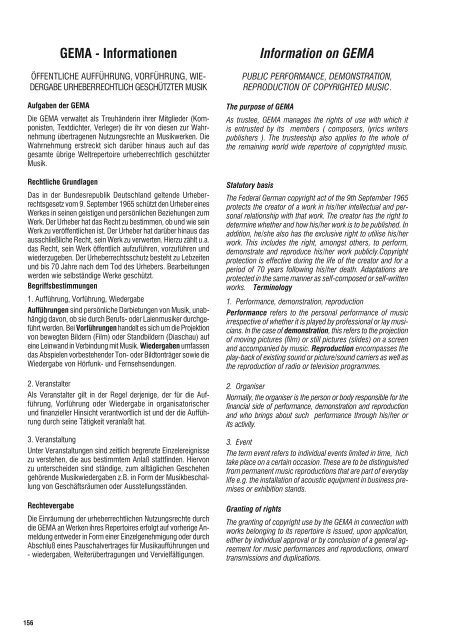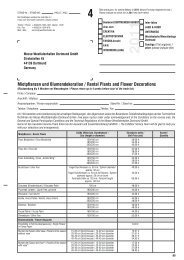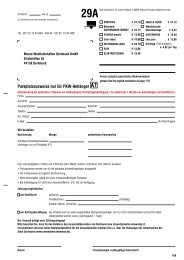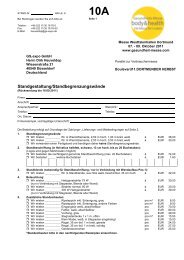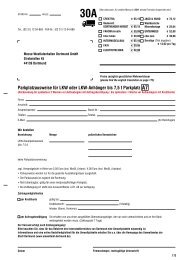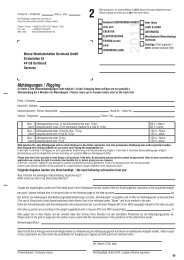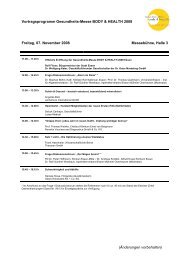GMBH2011_Aussteller-Service-Mappe_12-08-2011.pdf
GMBH2011_Aussteller-Service-Mappe_12-08-2011.pdf
GMBH2011_Aussteller-Service-Mappe_12-08-2011.pdf
Sie wollen auch ein ePaper? Erhöhen Sie die Reichweite Ihrer Titel.
YUMPU macht aus Druck-PDFs automatisch weboptimierte ePaper, die Google liebt.
156<br />
GEMA - Informationen<br />
ÖFFENTLICHE AUFFÜHRUNG, VORFÜHRUNG, WIE-<br />
DERGABE URHEBERRECHTLICH GESCHÜTZTER MUSIK<br />
Aufgaben der GEMA<br />
Die GEMA verwaltet als Treuhänderin ihrer Mitglieder (Komponisten,<br />
Textdichter, Verleger) die ihr von diesen zur Wahrnehmung<br />
übertragenen Nutzungsrechte an Musikwerken. Die<br />
Wahrnehmung erstreckt sich darüber hinaus auch auf das<br />
gesamte übrige Weltrepertoire urheberrechtlich geschützter<br />
Musik.<br />
Rechtliche Grundlagen<br />
Das in der Bundesrepublik Deutschland geltende Urheberrechtsgesetz<br />
vom 9. September 1965 schützt den Urheber eines<br />
Werkes in seinen geistigen und persönlichen Beziehungen zum<br />
Werk. Der Urheber hat das Recht zu bestimmen, ob und wie sein<br />
Werk zu veröffentlichen ist. Der Urheber hat darüber hinaus das<br />
ausschließliche Recht, sein Werk zu verwerten. Hierzu zählt u.a.<br />
das Recht, sein Werk öffentlich aufzuführen, vorzuführen und<br />
wiederzugeben. Der Urheberrechtsschutz besteht zu Lebzeiten<br />
und bis 70 Jahre nach dem Tod des Urhebers. Bearbeitungen<br />
werden wie selbständige Werke geschützt.<br />
Begriffsbestimmungen<br />
1. Aufführung, Vorführung, Wiedergabe<br />
Aufführungen sind persönliche Darbietungen von Musik, unabhängig<br />
davon, ob sie durch Berufs- oder Laienmusiker durchgeführt<br />
werden. Bei Vorführungen handelt es sich um die Projektion<br />
von bewegten Bildern (Film) oder Standbildern (Diaschau) auf<br />
eine Leinwand in Verbindung mit Musik. Wiedergaben umfassen<br />
das Abspielen vorbe ste hen der Ton- oder Bildtonträger sowie die<br />
Wiedergabe von Hörfunk- und Fernsehsendungen.<br />
2. Veranstalter<br />
Als Veranstalter gilt in der Regel derjenige, der für die Aufführung,<br />
Vorführung oder Wiedergabe in organisatorischer<br />
und finanzieller Hinsicht verantwortlich ist und der die Aufführung<br />
durch seine Tätigkeit veranlaßt hat.<br />
3. Veranstaltung<br />
Unter Veranstaltungen sind zeitlich begrenzte Einzelereignisse<br />
zu verstehen, die aus bestimmtem Anlaß stattfinden. Hiervon<br />
zu unterscheiden sind ständige, zum alltäglichen Geschehen<br />
gehörende Musikwiedergaben z.B. in Form der Musikbeschallung<br />
von Geschäftsräumen oder Ausstellungsständen.<br />
Rechtevergabe<br />
Die Einräumung der urheberrechtlichen Nutzungsrechte durch<br />
die GEMA an Werken ihres Repertoires erfolgt auf vorherige Anmeldung<br />
entweder in Form einer Einzelgenehmigung oder durch<br />
Abschluß eines Pauschalver trages für Musikaufführungen und<br />
- wiedergaben, Weiterübertragungen und Vervielfältigungen.<br />
Information on GEMA<br />
PUBLIC PERFORMANCE, DEMONSTRATION,<br />
REPRODUCTION OF COPYRIGHTED MUSIC.<br />
The purpose of GEMA<br />
As trustee, GEMA manages the rights of use with which it<br />
is entrusted by its members ( composers, lyrics writers<br />
publishers ). The trusteeship also applies to the whole of<br />
the remaining world wide repertoire of copyrighted music.<br />
Statutory basis<br />
The Federal German copyright act of the 9th September 1965<br />
protects the creator of a work in his/her intellectual and personal<br />
relationship with that work. The creator has the right to<br />
determine whether and how his/her work is to be published. In<br />
addition, he/she also has the exclusive right to utilise his/her<br />
work. This includes the right, amongst others, to perform,<br />
demonstrate and reproduce his/her work publicly.Copyright<br />
protection is effective during the life of the creator and for a<br />
period of 70 years following his/her death. Adaptations are<br />
protected in the same manner as self-composed or self-written<br />
works. Terminology<br />
1. Performance, demonstration, reproduction<br />
Performance refers to the personal performance of mu sic<br />
irrespective of whether it is played by professional or lay musicians.<br />
In the case of demonstration, this refers to the projection<br />
of moving pictures (film) or still pictures (slides) on a screen<br />
and accompanied by music. Repro duction encompasses the<br />
play-back of existing sound or picture/sound carriers as well as<br />
the reproduction of radio or television programmes.<br />
2. Organiser<br />
Normally, the organiser is the person or body responsible for the<br />
financial side of performance, demonstration and reproduction<br />
and who brings about such performance through his/her or<br />
its activity.<br />
3. Event<br />
The term event refers to individual events limited in time, hich<br />
take place on a certain occasion. These are to be distinguished<br />
from permanent music reproductions that are part of everyday<br />
life e.g. the installation of acoustic equipment in business premises<br />
or exhibition stands.<br />
Granting of rights<br />
The granting of copyright use by the GEMA in connection with<br />
works belonging to its repertoire is issued, upon application,<br />
either by individual approval or by conclusion of a general agreement<br />
for music performances and reproductions, onward<br />
transmissions and duplications.


